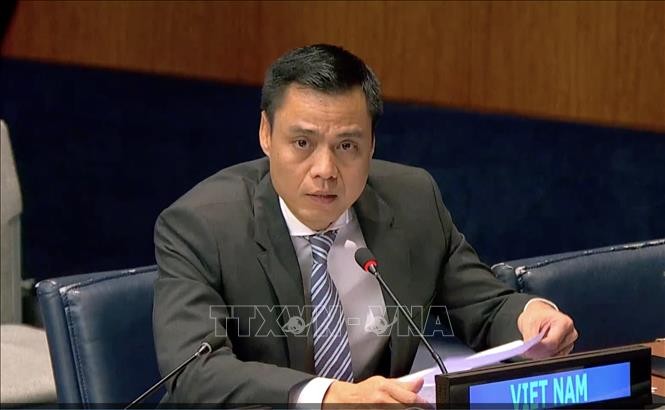(VOVWORLD) - Last week Vietnam and the island nation of Vanuatu co-hosted an online meeting on procedures for seeking advice from the International Court of Justice (ICJ) on national climate change obligations. The meeting affirmed Vietnam's determination to respond to climate change, a shared challenge of humanity recognized by the General Assembly of the United Nations in a Resolution in 2023.
 Ambassador Dang Hoang Giang, Head of the Permanent Delegation of Vietnam at the UN (Archive photo: VNA) Ambassador Dang Hoang Giang, Head of the Permanent Delegation of Vietnam at the UN (Archive photo: VNA) |
The meeting was attended by legal experts, scholars, and lawyers from 20 Asia-Pacific countries, representatives of delegations to the United Nations, and relevant Vietnamese agencies.
Vietnam’s determination to address shared challenges
In 2023 the United Nations General Assembly passed a Resolution recognizing climate change as a shared challenge and pointing out that the responsibility for responding to climate change must be shared equally. Vietnam, a developing country, is participating in the International Court of Justice’s review of climate change responses and giving advice on the issue to raise countries’ awareness and sense of legal responsibility for responding to climate change and to shape the legal framework on climate change.
By helping to organize the online meeting, Vietnam demonstrated its responsibility as a member state in complying with international law and international conventions on climate change, including the United Nations Framework Convention on Climate Change, the 2015 Paris Agreement, and the 1982 United Nations Convention on the Law of the Sea. Vietnam has helped developing countries, the UN General Assembly, and the ICJ to draw attention to the legal responsibilities of the countries that are causing large emissions that negatively impact today’s climate and the lives of future generations.
Responses to climate change
Vietnam is one of the five countries most affected by climate change and is being active and responsible in its climate change response. This has been repeatedly affirmed by Vietnamese government leaders and ministries, said Deputy Minister of Natural Resources and Environment Le Minh Ngan.
"Vietnam always demonstrates responsibility as an active member of the international community and is ready to cooperate with other countries in sharing scientific knowledge, experience, resources, and integrated management initiatives for a sustainable green economy and adaptation to climate change,' said Ngan.
Dao Xuan Lai, Head of the Department of Climate Change and Environment of the UN Development Program in Vietnam, said: "The Vietnamese government has committed to addressing climate change issues. In Vietnam, environmental protection is not only for current economic development but also helps sustainable future economic development and addresses climate change."
In 2021, for the first time, Vietnam made a commitment to achieving "net zero" emissions by 2025. The Government has established a National Steering Committee to implement Vietnam's commitments, chaired by Prime Minister Pham Minh Chinh. All ministries and sectors have also developed related implementation programs and plans. Truong Duc Tri, former Director of the Cooperation Project on Climate Change and Deputy Director of the Department of Hydro-Meteorology and Climate Change, said that the government, ministries, sectors, and localities have all mobilized international aid to help Vietnam respond to climate change.
In 2023 Vietnam and international partners adopted a Political Declaration to establish the Just Energy Transition Partnership (JETP) to implement green transition and reach the net zero emission goal by 2050. UK Prime Minister Rishi Sunak said: Vietnam is a dynamic, emerging economy at the heart of Southeast Asia and Vietnam's leadership is vital. Recognizing the importance and opportunity of moving to net zero by 2050, you're blazing a trail for others to follow."
Vietnam's recent commitments and actions and its organization of an online meeting on procedures for seeking advice from the International Court of Justice (JCJ) on national obligations reflect its determination to meet the challenge of global climate change.